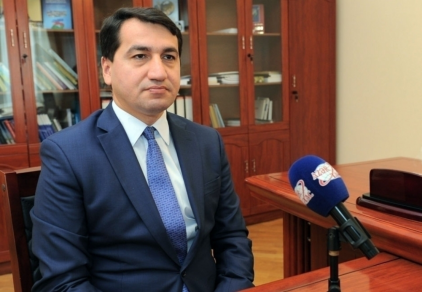 Hikmat Hajiyev: Armenia's national security strategy is like a fake history textbook
Hikmat Hajiyev: Armenia's national security strategy is like a fake history textbook
"Armenia has recently disclosed its new national security strategy. In his notes written as a preface to the strategy, Prime Minister Nikol Pashinyan widely refers to the history of Armenia, touches upon Armenian highlands, Hayk, King Artashes, Arshakids, the Kingdom of Van, the genocide and other similar historical moments of a mythical nature that do not fit with documents of such format at all," said Assistant to the President of Azerbaijan, Head of Foreign Policy Affairs Department of the Presidential Administration Hikmat Hajiyev as he commented on Armenia's new national security strategy.
The Assistant to the President notes that, in general, the national security strategy of Armenia looks like a fake history textbook.
"Such documents normally do not contain so many references to history. It feels that Armenia still remains a hostage of the past and its inferiority complex manifested itself in this document yet again.
Upon familiarization with the strategy, it becomes immediately obvious that the document promotes chauvinistic, xenophobic and racist values. There are messages about the greatness of the Armenian people, its superiority over other peoples, as well as intolerance towards neighboring nations. Quoting a poem by Vahan Teryan, the Armenian prime minister happily perceives the destruction of the great Babylonian civilization. As a matter of fact, the whole point of the strategy is centered in the quote that "Babylon was our enemy. Where is it now? It is covered by deserts!" Proponents of such thinking are no different from the terrorists destroying ancient historical sites in the Middle East. Seeing all this, it becomes clear how such a chauvinistic theory of fascist Garegin Nzhdeh as "Sekagron" appeared and why such ideologies are so widely promoted in Armenia.
Perhaps no country except for Armenia has included a poem in its national security strategy.
The document touches upon the "Velvet Revolution" and states that it has set new standards. However, a reference of this type in the national security strategy does not correspond to the format of the document and is completely illogical because such documents should not propagate any political forces and should instead describe the overall and long-term concept of national security. In other words, the concept should be a document that would meet the interests of the state, not of the authorities. It turns out that this strategy will automatically become invalid in the future after the forces opposed to Nikol Pashinyan and the "velvet revolution" come to power in Armenia. One gets the impression that this is a national security strategy not of Armenia, but of the government of Nikol Pashinyan who rose to power as a result of a "revolution" with the support of Soros and his entourage and receives money from the Soros Foundation.
The document contains numerous references to the Armenia-Azerbaijan conflict. The Azerbaijani side is accused and it is claimed that there is allegedly Armenophobia in Azerbaijan. In addition, the document contains issues related to the illegal regime Armenia has created in the occupied territories of Azerbaijan.
I would like to emphasize in this regard that the facts and arguments provided in the strategy in relation to the conflict are also false. Armenia has occupied Nagorno-Karabakh of Azerbaijan and seven adjacent districts. Armenia has committed genocide against the Azerbaijanis, carried out ethnic cleansing and perpetrated war crimes. Despite the demands of four UN Security Council resolutions, Armenia has not yet withdrawn its army from the occupied territories. Armenia is pursuing a policy of illegal activities in the occupied territories, including illegal settlement. Armenia is trying to destroy the traces of Azerbaijan in the occupied territories. By grossly violating the ceasefire on the line of contact and at the state border, Armenia commits provocations, deliberately shells Azerbaijan's civilian population and facilities. Armenia is not interested in negotiations, is trying to artificially delay the status quo and reinforce its occupation.
As for the far-fetched opinions about the April 2016 battles, I would like to note that Armenian armed forces resorted to yet another provocation against Azerbaijan then. Azerbaijan had to take retaliatory measures to protect its population. During the recent provocation Armenia committed in the direction of Tovuz district of the state border of Azerbaijan, civilian population and facilities were once again deliberately fired upon.
The document repeatedly refers to the principle of self-determination of peoples. It is noted that the so-called structure's right to self-determination must be unconditionally recognized.
Armenia is trying to cover up the fact of occupation with the principle of self-determination. Under no circumstances can this principle apply to the Nagorno-Karabakh region of Azerbaijan. This is occupation, not self-determination. The conflict must be resolved within the territorial integrity of Azerbaijan, and there is no alternative to this. As President of the Republic of Azerbaijan Ilham Aliyev said, "the territorial integrity of Azerbaijan has never been and will not be negotiable. Azerbaijan will not allow for the establishment of a second Armenian state on its territory."
This strategic document, which requires an unconditional and unlimited right of the so-called structure to self-determination and recognizes this illegal regime as a "free country", is in itself yet another heavy blow on the part of Armenia to the process of negotiations mediated by the OSCE Minsk Group. I believe that the co-chairs and the international community as a whole should issue a reaction to this document.
In general, comments on the territory of another state in a document belonging to Armenia itself are clear evidence of the policy of aggression.
The document states that Armenia is committed to negotiations within the framework of the OSCE Minsk Group. However, the statements of the prime minister of this country ("Karabakh is Armenia and full stop") and the minister of defense ("a new war for new lands"), attempts to involve the so-called regime in negotiations, as well as provocative opinions expressed in the strategy in connection with the conflict, prove that Armenia is deliberately disrupting negotiations and intends to continue the occupation.
The strategy notes that there must be the necessary lines of defense to ensure the security of the unrecognized structure, as well as safe diversified communications with the outside world, including Armenia. This is a hint at Lachin district and other occupied districts adjacent to the Nagorno-Karabakh region of Azerbaijan. This once again demonstrates that Armenia has no intention of returning the occupied Azerbaijani lands.
The document notes in several places that Armenia is the guarantor of the security of the so-called structure. This is overt recognition of the fact of occupation. In addition, it is argued that Azerbaijan's desire to resolve the conflict by military means poses a threat to the physical existence of the population of the so-called structure. In essence, the aggressive policy of Armenia has put an end to the physical existence of the civilian population of Azerbaijan in its native lands. Having driven out about a million civilian Azerbaijanis from their native lands, Armenia carried out a policy of ethnic cleansing.
The strategy notes that the goal of the negotiations is to "preserve the outcomes of the war". This explicitly shows that Armenia intends to keep on occupying the territories of Azerbaijan and is not interested in negotiations that serve a sustainable peace.
Familiarization with the document reveals once again that Armenia's latest provocation in the direction of Tovuz district of Azerbaijan was carried out on purpose.
The strategy clearly shows the presence of Azerbaijanophobia in Armenia. Hatred of Azerbaijanis is openly propagated in this country.
The document dwells upon the far-fetched massacres against the Armenians allegedly committed by the Azerbaijani side. Ganja is described as Gandzak. Such claims of the country that has committed a genocide and atrocities against the Azerbaijanis, destroyed our heritage and changed place names in Armenia and the occupied territories are true hypocrisy.
The strategy notes that there is no place for violence and xenophobia in Armenian society. In fact, however, Armenia has itself ousted more than a million Azerbaijanis from its territory and the occupied lands. Armenia is a country that has destroyed mosques, historical sites and graves. Xenophobia has reached such a level that the architectural features and essence of the Blue Mosque in Yerevan and the Yukhari Govhar Agha Mosque in Shusha have been changed and they are portrayed as Iranian monuments. Armenia has destroyed the grave of great Azerbaijani poet, ashiq Alasgar. The former Armenian president said in the center of Europe in 2003 that "the Armenians and the Azerbaijanis are ethnically incompatible".
The document states that the Armenians are victims of the first "genocide" of the 20th century and that Armenia pays special attention to the topic of preventing genocide at the international level. This is yet another lie. Armenia has itself committed an act of genocide against the Azerbaijanis in Khojaly at the end of the 20th century.
The strategy also reflects on Turkey and makes references to the so-called genocide. The reason for this is that Turkey, guided by international law and historical justice, calls on Armenia to vacate the occupied territories of Azerbaijan. Armenia is tuned in to a mythical history and shows again that it cannot coexist peacefully with its neighbors. For this reason, the future development of Armenia as a state is not possible.
The document mentions that Armenia is worried about the fact that the region is lagging behind in the sphere of democracy and human rights. It is noted that Azerbaijan and Turkey are lagging behind in the field of democracy and human rights, and this negatively affects the fulfillment of international obligations by these countries. This is further evidence of racism and chauvinism. I believe that Armenia, a country that has occupied the territory of another state and carried out ethnic cleansing, is the very last country that has the right to talk about human rights. Let Armenia, which has shamelessly proclaimed itself a herald of democracy and a champion of human rights, not be worried about us and instead pay attention to the human rights problems that are pervasive in this country.
In general, Armenia's rant about democracy and human rights is ridiculous in itself. For about 20 years, a military junta was in power in this country, high-ranking government officials were shot in parliament and the current prime minister threatens to "roll up his opponents in asphalt" and he does. Politicians and journalists in Armenia are persecuted for their political beliefs. Journalist Mher Yeghiazaryan died in prison after a hunger strike.
The document makes references to certain threats in the region. I would like to emphasize that the biggest threat to the region is posed by Armenia itself and its aggressive policy. The biggest threat to the national security of Armenia is posed precisely by Armenia itself and the policy of Nikol Pashinyan's government.
The strategy notes that Azerbaijan and Turkey keep Armenia in an economic blockade and have sidelined it from regional projects. This is a clear lie. The fact that Armenia is making such claims while continuing to occupy the internationally recognized territories of Azerbaijan defies all boundaries.
The document indicates that Armenia's foreign policy views are based on international, interethnic and inter-civilizational dialogue. Armenia's putting forward such a thesis is ridiculous. It is completely wide of the mark. As noted above, Armenia has carried out ethnic cleansing on its territory and the occupied territories of Azerbaijan, destroyed and appropriated the cultural and historical sites of the Azerbaijani people. The foreign policy of such a state cannot be based on interethnic and inter-civilizational dialogue. In 2016, Armenia was the only country to boycott the Seventh Global Forum of the UN Alliance of Civilizations held in Azerbaijan. This shows once again that the values proclaimed by Armenia and the values of the UN Alliance of Civilizations contradict each other.
The strategy talks about the development of relations between Armenia and countries of the Middle East. Armenia has occupied the territory of a country belonging to the Muslim world and is destroying its Islamic heritage. What kind of cooperation between this country and Muslim countries can we talk about? I believe that countries of the Middle East should take this into account.
The strategy mentions that Armenia will work with CSTO member states towards fulfillment of their allied obligations in relations with each other and enhance the effectiveness of this organization. This looks as though Armenia is the owner of this organization and edifies its members. Without consulting with any of the CSTO members, Armenia arrested its former secretary general and now intends to teach other members of the organization a lesson about their obligations. Armenia, which boycotted the appointment of a new CSTO secretary general for a long time, dealt a serious blow to the effectiveness of the organization. As President of the Republic of Azerbaijan Ilham Aliyev noted, "the Soros scum cannot be CSTO allies."
The strategy states further that Armenia promotes freedom of speech and pluralism and is opposed to terrorism and extremism. However, this is a complete lie. Just recently, the Armenians brutally attacked and wounded Azerbaijanis in Los Angeles, Brussels and other cities around the world. This is the result of Armenia's extremist policy. The Armenian diaspora also promotes the ideology of unfounded and mythical Armenian exclusivity. As a result, the diaspora, through its destructive activities, creates additional obstacles to the settlement of the Armenia-Azerbaijan conflict.
As for the "pan-Armenian" views contained in the document, I would like to note that it actually represents interference in the internal affairs of other countries because Armenia thereby sets directions and priorities for the Armenians living there.
The strategy notes that conditions will be created for the repatriation of Armenians to Armenia. Thus, Armenia intends to acquire additional human resources to implement the policy of illegal settlement in the occupied territories of Azerbaijan.
The document openly recognizes the presence of a demographic crisis, abject poverty, social inequality and social polarization in Armenia. Growing emigration is cited as one of the key problems. Along with this, opinions related to the economic development of Armenia are also expressed. However, we must not forget that as long as Armenia keeps Azerbaijani lands under occupation, it will remain on the sidelines of regional economic projects and will live in economic isolation. As long as the conflict remains unresolved, it is meaningless to talk about any prospects for the economic development of Armenia, as well as the elimination of emigration, poverty, unemployment and social inequality.
Stabilization of population figures and achievement of demographic growth are set as the goals of the Armenian state. However, if Armenia continues its occupying policy, it will not be able to achieve these goals and the situation will deteriorate further because people do not believe in the future of Armenia and many Armenians leave the country in fear of confrontation with Azerbaijan.
The strategy notes that in the process of development of Armenia as a center of high technologies, special importance will be attached to the role of the science and education. However, as the strategy itself acknowledges, how can this goal ever be achieved against the background of exodus of educated people?
The document states that forcible solution of domestic problems among the Armenians is unacceptable and that settlement should be carried out through free courts. But political pressure on courts, which are already not free, is growing and the Constitutional Court, which does not want to follow the instructions of the prime minister, comes under pressure and judges are replaced.
Logically, the section of the document on the environment should have dealt with the issue of the Metsamor nuclear power plant, but interestingly enough, there is not a word about it. However, this nuclear power plant with a long expired service life is located in an active seismic zone and the primary source of danger for Armenia itself.
In general, the analysis of the document shows that Armenia focuses its attention not on issues of economic development, education and science, but on baseless accusations against Azerbaijan and Turkey. This characterizes the outlook of the Armenian government for the future. The main goal is to keep the Armenian people hostage to the conflict," Hikmat Hajiyev said.
https://azertag.az/en/xeber/Hikmat_Hajiyev_Armenias_national_security_strategy_is_like_a_fake_history_textbook-1559745
მსგავსი სიახლეები
 Koba Kobaladze awarded the participants of Zurab Iarajuli Memorial Tournament
Koba Kobaladze awarded the participants of Zurab Iarajuli Memorial Tournament
 Competition named after the hero of August War was held in mini football
Competition named after the hero of August War was held in mini football
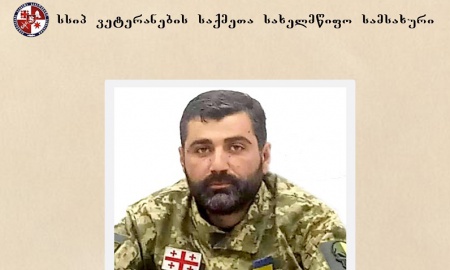 Koba Kobaladze offered his condolences to the family of Georgian soldier killed in Ukraine
Koba Kobaladze offered his condolences to the family of Georgian soldier killed in Ukraine
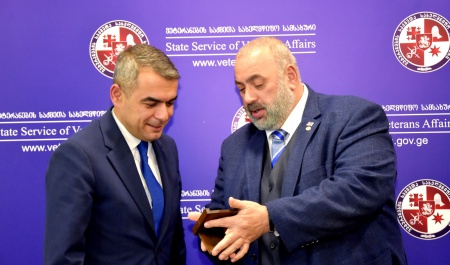 Koba Kobaladze held a meeting with the Turkish military attache
Koba Kobaladze held a meeting with the Turkish military attache
 An exclusive interview of “The Georgian Times” with a famous Georgian businessman Davit Iakobashvili
An exclusive interview of “The Georgian Times” with a famous Georgian businessman Davit Iakobashvili
 Chapidze Emergency Cardiology Center to hold a charity campaign
Chapidze Emergency Cardiology Center to hold a charity campaign
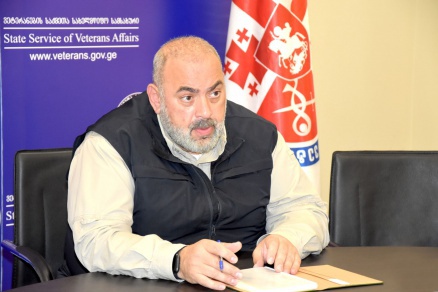 “There is a time when you have to fight and there is a time when you have to prepare for this fight...” - Koba Kobaladze
“There is a time when you have to fight and there is a time when you have to prepare for this fight...” - Koba Kobaladze
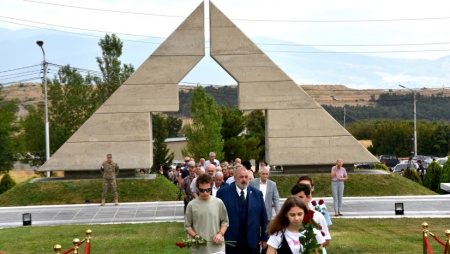 Koba Kobaladze laid a wreath at the graves of the soldiers died in the war of August 8 and paid tribute to the memory of the heroes who fell on the battlefield for the unity of the country
Koba Kobaladze laid a wreath at the graves of the soldiers died in the war of August 8 and paid tribute to the memory of the heroes who fell on the battlefield for the unity of the country
 Nikoloz Kvezereli attended the events dedicated to the Independence Day in Akhmeta Municipality
Nikoloz Kvezereli attended the events dedicated to the Independence Day in Akhmeta Municipality
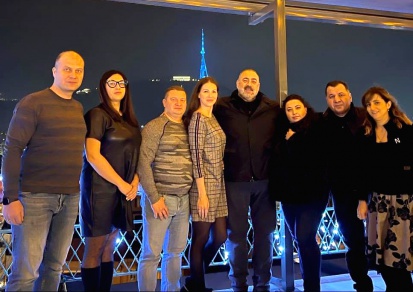 Koba Kobaladze met with the representatives of “TAPS Ukraine”
Koba Kobaladze met with the representatives of “TAPS Ukraine”
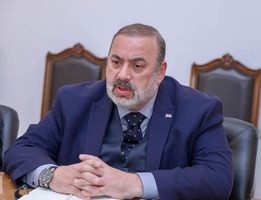 Koba Kobaladze continues his official visit to Ukraine
Koba Kobaladze continues his official visit to Ukraine
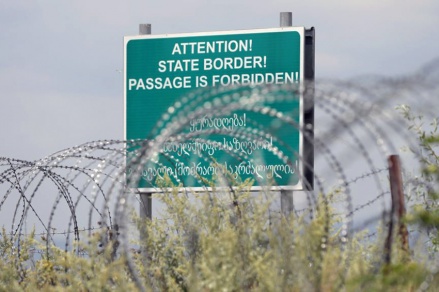 U.N. Members Stand By Georgia, Condemn Occupations
U.N. Members Stand By Georgia, Condemn Occupations
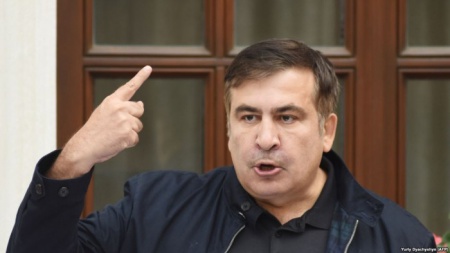 Memorandum of Understanding with the charitable foundations REGI BASE and REGI BASE GEORGIA
Memorandum of Understanding with the charitable foundations REGI BASE and REGI BASE GEORGIA
 EU: Israeli response 'needs to be proportionate and with maximum restraint'
EU: Israeli response 'needs to be proportionate and with maximum restraint'
 The United States Embassy is deeply concerned by the government’s decision to detain the head of a major opposition political party at the party’s headquarters this morning
The United States Embassy is deeply concerned by the government’s decision to detain the head of a major opposition political party at the party’s headquarters this morning
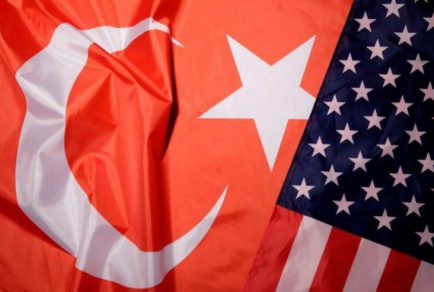 Majority of U.S. senators urge Biden to press Turkey on rights
Majority of U.S. senators urge Biden to press Turkey on rights
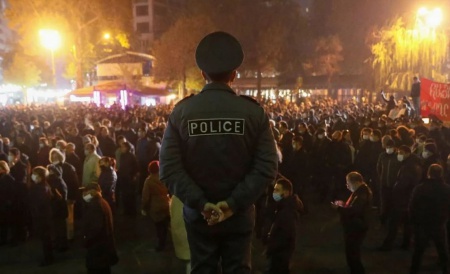 The True Source of Troubles Behind the Nagorno-Karabakh Conflict
The True Source of Troubles Behind the Nagorno-Karabakh Conflict
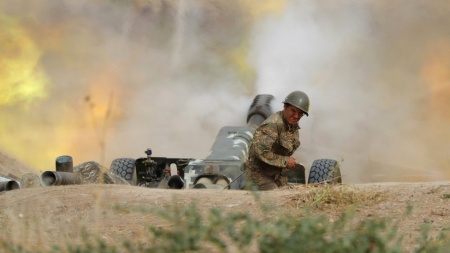 Armenia-Azerbaijan Conflict: A Fight about International Law not Religion
Armenia-Azerbaijan Conflict: A Fight about International Law not Religion
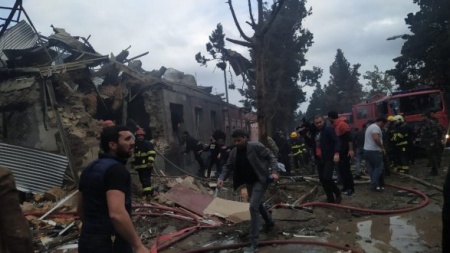 Armenia-Azerbaijan Conflict: A Fight about International Law not Religion
Armenia-Azerbaijan Conflict: A Fight about International Law not Religion
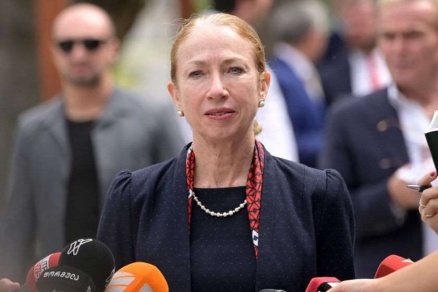 Civilian casualties and damage inflicted upon civilian infrastructure as a result of Armenia’s act of aggression against Azerbaijan
Civilian casualties and damage inflicted upon civilian infrastructure as a result of Armenia’s act of aggression against Azerbaijan